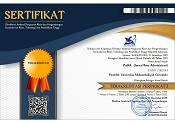Effect of Notice of Tax Warning, Notice of Tax Collection, and Tax Education Programs on Tax Compliance in West Sumatera and Jambi
Abstract
This research examines the two components of the Slippery Slope framework, power, and trust, in influencing formal tax compliance in the West Sumatera and Jambi region. The supervision factors: Notice of Tax Warning and Notice of Tax Collection are used as a proxy of power, and public education program is used as a proxy of trust in the authority. Secondary data collected through documentation study is presented in panel data and then analyzed using panel data regression analysis. As this study uses a mixed quantitative and qualitative method, we conducted in-depth interviews with key informants to get a more robust analysis. This study shows that together and partially, these three factors have a positive and significant effect on formal tax compliance. Notice of Tax Warning and Notice of Tax Collection effectively deliver law enforcement's message as a coercive power through supervision efforts. At the same time, tax education programs are practical to encourage awareness and trust in the authority that ultimately improves tax compliance. This study recommends some improvements in administrative issues and strategies to reach more taxpayers, perform more fair treatment, and enhance compliance.
Keywords
Full Text:
PDFReferences
Akumbo, S., Mbilla, S., Abiire, A., Atindaana, P., Ayimpoya, R., & Ghana, I. (2020). Tax Education And Tax Compliance.
Almond, Gabriel., Verba, S. (1963). The Civic Culture : Political Attitudes and Democracy in Five Nations. Princeton University Press.
Alms, J., & Torgler, B. (2011). Do ethics matter? Tax Compliance and Morality. Journal of Business Ethics.
Carpio, L. (2014). Are the Neighbors Cheating? Evidence from a Social Norm Experiment on Property Taxes in Peru. Job Market Paper.
Castro, L., & Scartascini, C. (2015). Tax compliance and enforcement in the pampas evidence from a field experiment. Journal of Economic Behavior & Organization, 116, 65–82. https://doi.org/https://doi.org/10.1016/j.jebo.2015.04.002
Devano, S., & Rahayu, S. . (2006). Perpajakan: Konsep, Teori dan Isu. PT. Kencana.
Fahr, R., & Djawadi, B. M. (2013). The impact of tax knowledge and budget spending influence on tax compliance (IZA Discussion Paper 7255). https://papers.ssrn.com/sol3/papers.cfm?abstract_id=2234277
Gangl, K., Hofmann, E., Pollai, M., & Kirchler, E. (2012). The dynamics of power and trust in the ‘slippery slope framework’ and its impact on the tax climate. SSRN Electronic Journal.
Gangl, K., Torgler, B., & Hofmann, E. (2014). Effects of supervision on tax compliance: Evidence from a field experiment in Austria. Economics Letters, 123, 378–382.
Kirchler, E. (2007). The economic psycology of tax behavior. Cambridge University Press.
Kirchler, E. (2013). Trust and Power as Determinants of Tax Compliance: Testing the Assumptions of the Slippery Slope Framework in Austria, Hungary, Romania, and Russia. Journal of Economic Psychology, 34, 169–180.
LE, H., TUYET, V., HANH, C., & Do, Q. H. (2020). Factors Affecting Tax Compliance among Small- and Medium-sized Enterprises: Evidence from Vietnam. The Journal of Asian Finance, Economics and Business, 7, 209–217. https://doi.org/10.13106/jafeb.2020.vol7.no7.209
Luttmer, E., & Singhal, M. (2014). Tax Morale. Journal of Economic Perspective, 28(4), 149–168.
Mardiasmo. (2016). Perpajakan Edisi Revisi. Andi.
Mukhlis, I., Utomo, S. H., & Soesetyo, Y. (2014). Increasing tax compliance through strengthening capacity of education sector for export oriented SMES handicraft fields in East Java Indonesia. European Scientific Journal, 10(7).
Mulder, L. B. (2016). When sanctions convey moral norms. European Journal of Law and Economics.
Murphy, K., Bradford, B., & Jackson, J. (2015). Motivating Compliance Behavior Among Offenders: Procedural Justice or Deterrence? Criminal Justice and Behavior. https://doi.org/10.1177/0093854815611166
Naicker, Y., & Rajaram, R. (2019). Factors that Influence Tax Compliance of SMEs in South Africa. Acta Universitatis Danubius: Administratio, Vol 10, 94–111.
Nasution, M., Santi, F., Husaini, H., Fadli, & Pirzada, K. (2020). Determinants of tax compliance: A study on individual taxpayers in Indonesia. Entrepreneurship and Sustainability Issues, 8, 1401–1418. https://doi.org/10.9770/jesi.2020.8.2(82)
Olowookere, J. K., & Fasina, H. T. (2013). Taxpayers ’ Education : A Key Strategy in Achieving Voluntary Compliance in Lagos State , Nigeria. European Journal of Business and Management, 5(10), 146–155.
Organisation For Economic Co-Operation And Development (OECD). (2004). Compliance Risk Management: Managing and Improving Tax Compliance. Centre for Tax Policy and Administration (CTPA), October, Hal: 1-73. https://www.oecd.org/tax/administration/33818656.pdf
Palil, M. R., & Rusyidi, M. A. (2013). The Perception of Tax Payers on Tax Knowledge and Tax Education with Level of Tax Compliance: A Study the Influences of Religiosity. ASEAN Journal of Economics, Management and Accounting, 1(1), 118–129.
Putra, A. M., & Hidayat, N. (2018). The Influence Of Taxpayer Compliance And Tax Sanction On Amnesty Tax Participation. South East Asia Journal of Contemporary Business, Economics and Law, 16(5).
Ramirez Zamudio, A., & López-Pérez, R. (2018). Social Norms and Tax Compliance: Experiments and Theory.
Robbins, B. G., & Kiser, E. (2019). State Coercion, moral attitudes, and tax compliance: Evidence from a national factorial survey experiment of income tax evasion.
Soemarso, S. . (2007). Perpajakan Pendekatan Komprehensif. Salemba Empat.
Taxes, D. G. of. (2020). Rencana strategis direktorat jenderal
pajak tahun 2020-2024.
Williamson, V. S. (2017). Read My Lips: Why Americans Are Proud to Pay Taxes. Princeton University Press.
Yuesti, A. (2019). Correlation of Tax Behavior with Tax Compliance. International Journal of Innovation, Creativity and Change, 9(5).
Article metrics
Refbacks
- There are currently no refbacks.
Copyright (c) 2021 Publik (Jurnal Ilmu Administrasi)

This work is licensed under a Creative Commons Attribution-ShareAlike 4.0 International License.

Publik (Jurnal Ilmu Administrasi) is licensed under a Creative Commons Attribution-ShareAlike 4.0 International License.










